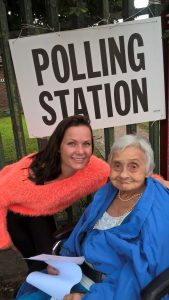People with learning disabilities are being helped to exercise their fundamental right to vote in elections under a scheme run by care provider Dimensions. Simon Jarrett reports
A key element of civic participation in a democracy is to be able to express your political preference through the ballot box.
For many years, people were deemed legally incapable of voting, based on Victorian legislation about “lunatics” and “idiots”; these rules were largely removed by the Electoral Administration Act 2006.
Anyone aged over 18, including those who have a guardian or welfare attorney, as well as care home residents, has the right to vote, provided they are able to vote on their own behalf. A guardian or welfare attorney cannot decide who to vote for on behalf of the adult, although they can help the person to register or cast a proxy vote.
Electoral registration officers are expected to assist people who may have any difficulties with the registration process because of physical or mental disabilities.
A person must choose for themselves who to vote for – no one can decide on their behalf. This leaves a grey area, often at the discretion of presiding officers, which can still cast doubt on the capacity of people with learning disabilities to vote, particularly those with severe impairments.
Care provider Dimensions became aware of the problems that can face learning disabled voters during the general election of 2005, when it received feedback from a number of people on the difficulties they had experienced in exercising their right to vote.
One of them, a Dimensions council member who has mild learning disabilities and cerebral palsy, was turned away from the polling station as he had a family member helping him to read the candidates’ names and information in the polling station and the booth. The presiding officer said that his family member was not allowed to come into the station, let alone the booth, which caused his anxiety levels to rise to a level where the only option was for him to leave. As a result, he never got to cast his vote in the 2005 general election.
In response to this, Dimensions developed a voting passport to help
make polling stations and the voting process more accessible for people with learning disabilities or autism.
A voting passport is an easy-to-read A4 sheet of information about an individual’s voting needs. It is designed to be handed to polling staff so they can easily understand the reasonable adjustments needed to make a person feel more comfortable to vote.
It includes an “About me” section with the person’s name, a list of things to help them to vote and space for the person to write who they would like support from, their name and if they are eligible to vote in the UK.
The passport also includes a section on legal rights about voting to debunk common myths about voting rights for people with learning disabilities, which can be held even by presiding officers.
It also explains what other people can do, such as explain the ballot options or accompany someone into the polling booth, and what they cannot do, such as make a decision for a person or mark the ballot paper against their wishes.
The passport has been used successfully since 2014. Feedback from people using it showed it provided easy steps to get through the voting process and reinforced their determination to participate in the national political conversation.
To be outside the voting process is to be seen as someone who has no stake on society, and therefore lacking the rights citizenship confers.
To participate in public life is to be a person with rights. That is why participation in the voting process – still alarmingly low in the community of people with learning disabilities – is an essential exercise in personal power. n
To download a free copy of the Dimensions voting passport, and for more information about their Love Your Vote campaign, go to www.dimensions-uk.org/campaign/love-your-vote/

